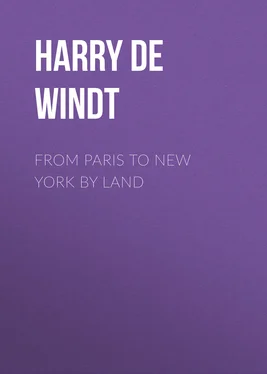Harry De Windt - From Paris to New York by Land
Здесь есть возможность читать онлайн «Harry De Windt - From Paris to New York by Land» — ознакомительный отрывок электронной книги совершенно бесплатно, а после прочтения отрывка купить полную версию. В некоторых случаях можно слушать аудио, скачать через торрент в формате fb2 и присутствует краткое содержание. Жанр: foreign_prose, foreign_antique, на английском языке. Описание произведения, (предисловие) а так же отзывы посетителей доступны на портале библиотеки ЛибКат.
- Название:From Paris to New York by Land
- Автор:
- Жанр:
- Год:неизвестен
- ISBN:нет данных
- Рейтинг книги:4 / 5. Голосов: 1
-
Избранное:Добавить в избранное
- Отзывы:
-
Ваша оценка:
- 80
- 1
- 2
- 3
- 4
- 5
From Paris to New York by Land: краткое содержание, описание и аннотация
Предлагаем к чтению аннотацию, описание, краткое содержание или предисловие (зависит от того, что написал сам автор книги «From Paris to New York by Land»). Если вы не нашли необходимую информацию о книге — напишите в комментариях, мы постараемся отыскать её.
From Paris to New York by Land — читать онлайн ознакомительный отрывок
Ниже представлен текст книги, разбитый по страницам. Система сохранения места последней прочитанной страницы, позволяет с удобством читать онлайн бесплатно книгу «From Paris to New York by Land», без необходимости каждый раз заново искать на чём Вы остановились. Поставьте закладку, и сможете в любой момент перейти на страницу, на которой закончили чтение.
Интервал:
Закладка:
Yakutsk (which was founded in 1633 by the Cossack Beketoff) presents, at a distance, a rather imposing appearance, quickly dispelled on closer acquaintance. For a more lifeless, depressing city does not exist on the face of this planet. Even Siberians call this the end of the world. The very name of the place suggests gloom and mystery, for the news that filters through from here, at long intervals, into civilisation is generally associated with some tragedy or disaster, such as the awful fate of poor de Long and his companions of the Jeannette in the Lena delta, or more recently the Yakutsk Prison Mutiny. The Tsar's remotest capital is composed mainly of time-bleached wooden buildings of gloomy appearance even on the brightest day. We saw Yakutsk at its best, for in summer time the dusty streets and dingy dwellings are revealed in all the dirt and squalor which were concealed from our gaze by a clean mantle of snow. There are no public buildings to speak of, but the golden domes of half a dozen fine churches tower over the dull drab town, partly relieving the sombre effect produced by an absolute lack of colour. Even the palace of the Governor is a mean-looking one-storied edifice, scarcely fit for the ruler of a province seven times the size of France! A Cossack stockade of great age faces the palace; and its dilapidated wooden walls are tottering with age, but are yet in keeping with most of the houses around them. There is a legend concerning this fort (erected by Cossacks in 1647) which may, or may not, be true. The natives granted these first settlers as much land, for the erection of a citadel, as they could encircle with a limited number of reindeer skins. But the wily Russians cut the skins into thin, very long strips and took possession of an extensive site for a town. At present Yakutsk is a city of the past, one may almost add of the dead, where ghosts walk in the shape of surly Russian traders clad in the fashion of a century ago, and sinister-looking fur-clad Yakutes. And yet the dead here may be said to live, for corruption is delayed for an indefinite period, so intense is the cold. Shortly before our arrival a young Russian girl was exhumed for legal purposes, and her body was found in exactly the same condition as when it was interred five years before. This however is scarcely surprising in a soil which is perpetually frozen to a depth of six hundred feet.
The uncanny sensation of gloom and despondency which here assails the traveller is not mitigated by the knowledge that, to reach Yakutsk you must slowly wade, as we had done, through a little hell of monotony, hunger, and filth. To leave it you must retrace your steps through the same purgatory of mental and physical misery. There is no other way home, and so, to the stranger fresh from Europe, the place is a sink of despair. And yet Yakutsk only needs capital, energy, and enterprise to convert her into a centre of modern commerce and civilisation. Gold abounds in all the affluents of the Lena; last year the output in the Vitimsk district alone was over a quarter of a million sterling, and the soil is practically untouched. Iron also exists in very large quantities, to say nothing of very fair steam coal near the delta; and there is practically a mountain of silver known to exist near the city. Lead and platinum have also been found in considerable quantities further afield. Were the Yakutsk province an American State the now desolate shores of the Lena would swarm with prosperous towns, and the city would long ere this have become a Siberian El Dorado of the merchant and miner. 13 13 In face of these natural resources it is satisfactory to note that a line from Irkutsk to Yakutsk could be laid with little difficulty.
As it is the trade of this place is nothing to what it could be made, in capable and energetic hands, within a very short space of time. Here, as everywhere else on the river, the summer is the busiest season. In August a fair is held on the Lena in barges, which drift down the river from the Ust-kutsk with European merchandise of every description. In the fall the barges are towed back by steamers, exporting furs, fish, and ivory to the value of twenty million roubles, the goods brought in only amounting to about a twentieth part of that sum. Steamers run frequently in the open season both up and down the river as far as Bulun in the Arctic Ocean, which tiny settlement yearly exports large quantities of salt fish, furs, and walrus tusks. 14 14 Steam navigation on the Lena river was introduced in 1885.
In former days before the Russians annexed the Amur river there was regular communication between Yakutsk and Okhotsk, on the sea of that name, but although the road, or rather track, still exists, it is now rarely used. 15 15 See projected railway route, chap. xix.
However, American and Chinese goods do occasionally find their way into Siberia by Okhotsk, for the latter is a free port, and if merchandise is destined for the Lena province, it is cheaper to send it in this way than viâ Vladivostok and the Amur, especially as steamers now visit the Sea of Okhotsk every summer, sailing from Vladivostok and making the round trip viâ Gijija, Ayan, and Okhotsk. 16 16 The Port of Ola is now also called at.
In winter time, when the track is in good condition, the trip from Okhotsk to Yakutsk occupies about a fortnight, with horse sledges. In summer the goods are carried over the mountains to the head of the Nelkan River, which is reached twice during the season by steamers plying from Yakutsk, a journey of two weeks up stream and about half the time down. The Nelkan district is said to be fabulously rich in gold, so much so that Mr. Siberikoff, a prominent Siberian millionaire, lately visited the place with a view to constructing a railway to connect Nelkan with Ayan, on the Sea of Okhotsk, a distance of about two hundred versts. 17 17 This line is now commenced. See chap. xix.
The line would be a costly one, but the country is said to be so rich, that no expense is to be spared in opening it up. Steamers also run from Yakutsk up to Viluisk, but the trade with this place amounts to very little, £5000 or £6000 in all, every summer. Near Viluisk is the Hospital for Lepers founded some years ago by the English nurse, Miss Kate Marsden. In view of the conflicting statements which have appeared in England regarding this institution it is only fair to say that the lady in question is still spoken of in Yakutsk with respect and affection, and that the infirmary, which after much suffering and hardship she contrived to organise, is still in a flourishing condition. In 1901 it contained more than seventy patients in charge of a physician, his two assistants and three sisters of charity.
As for the climate here it is no better and no worse than other places in this latitude, although Yakutsk is said to be the coldest place in winter and the hottest in summer in the world. But this is probably a mistake, for I carefully searched records of the temperature kept daily for the past fifteen years, and found that the greatest summer heat experienced during that period was 78° Fahrenheit in the shade, which is cooler than an average English summer; 69° below zero appeared to be the greatest cold here between the months of October and March, while at Verkhoyansk we experienced 78° below zero, which is, I imagine, about as low as the thermometer can fall on this earth. Winter here begins in September, and by the first week in October the country is ice-bound, and semi-darkness and 55° to 65° below zero continue until the spring. In May the Lena breaks up, flooding the country for hundreds of miles and isolating Yakutsk for about a month, during which you can neither get to the city nor leave it. 18 18 The Lena is not perfectly free from ice until the end of May or early in June. By October 20 it is generally frozen over. "It is a peculiarity of these northern rivers that their waters are mainly derived from the melting snows in June and July, when the Lena, for example, overflowing its banks, spreads here and there to a width of 60 miles or more."—("In the Lena Delta," by G. W. Melville.)
During the three months of summer dust and clouds or mosquitoes render life almost unbearable. And yet Yakutsk is a paradise compared to a certain settlement, which I shall presently describe, within the Arctic circle.
Интервал:
Закладка:
Похожие книги на «From Paris to New York by Land»
Представляем Вашему вниманию похожие книги на «From Paris to New York by Land» списком для выбора. Мы отобрали схожую по названию и смыслу литературу в надежде предоставить читателям больше вариантов отыскать новые, интересные, ещё непрочитанные произведения.
Обсуждение, отзывы о книге «From Paris to New York by Land» и просто собственные мнения читателей. Оставьте ваши комментарии, напишите, что Вы думаете о произведении, его смысле или главных героях. Укажите что конкретно понравилось, а что нет, и почему Вы так считаете.












